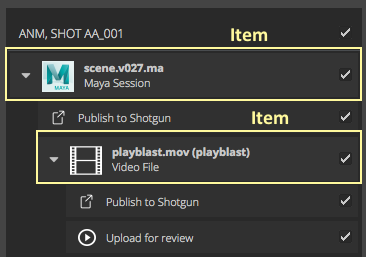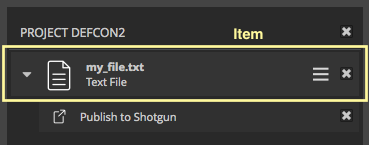Collector¶
The collector hook handles processing the current user’s session for items to publish. It also handles processing any file paths that have been dragged and dropped onto the Publisher. It’s primary purpose is to discover and classify items to present to the user for publishing.
To define custom collection behavior for drag/drop or within a DCC, you simply need to write a collector plugin or take over and modify one of the collectors that come with the shipped integrations. For example, to allow publishing of cameras in Maya, you could take over the Maya collector and add the logic for creating publish items for each camera to be published in the current session.
Collector API¶
-
class
tk_multi_publish2.base_hooks.CollectorPlugin(parent)[source]¶ Bases:
tank.hook.HookThis class defines the required interface for a collector plugin. Collectors are used to gather individual files that are loaded via the file browser or dragged and dropped into the Publish2 UI. It is also used to gather items to be published within the current DCC session.
-
settings¶ A
dictdefining the configuration interface for this collector.The values configured for the collector will be supplied via settings parameter in the
process_current_session()andprocess_file()methods.The dictionary can include any number of settings required by the collector, and takes the form:
{ <setting_name>: { "type": <type>, "default": <default>, "description": <description> }, <setting_name>: { "type": <type>, "default": <default>, "description": <description> }, ... }
The keys in the dictionary represent the names of the settings. The values are a dictionary comprised of 3 additional key/value pairs.
type: The type of the setting. This should correspond to one of the data types that toolkit accepts for app and engine settings such ashook,template,string, etc.default: The default value for the settings. This can beNone.description: A description of the setting as a string.
Example implementation:
@property def settings(self): return { "Work Template": { "type": "template", "default": None, "description": "A work file template required by this collector." }, "Exclude Objects": { "type": "list", "default": ["obj1", "obj2", "obj3"], "description": "A list of objects to ignore." } }
The settings are exposed via the
collector_settingssetting in the app’s configuration. Example:collector_settings: Work Template: my_work_template Exclude Objects: [obj1, obj4]
Note
See the hooks defined in the publisher app’s
hooks/folder for additional example implementations.
-
process_current_session(settings, parent_item)[source]¶ This method analyzes the current engine session and creates a hierarchy of items for publishing.
A typical implementation of this method would create an item that represents the current session (e.g. the current Maya file) or all open documents in a multi-document scenario (such as Photoshop). Top level items area created as children of the supplied
parent_item.Any additional items, specific to the current session, can then be created as children of the session item. This is not a requirement however.
The image below shows a maya scene item with a child item that represents a playblast to be published. Each of these items has one or more publish tasks attached to them.

The
settingsargument is a dictionary where the keys are the names of the settings defined by thesettings()property and the values areSettinginstances as configured for this instance of the publish app.To create items within this method, use the
create_item()method available on the suppliedparent_item.Example Maya implementation:
def process_current_session(settings, parent_item): path = cmds.file(query=True, sn=True) session_item = parent_item.create_item( "maya.session", "Maya Session", os.path.basename(path) ) # additional work here to prep the session item such as defining # an icon, populating the properties dictionary, etc. session_item.properties["path"] = path # collect additional file types, parented under the session self._collect_geometry(settings, session_item)
Note
See the hooks defined in the publisher app’s
hooks/folder for additional example implementations.Parameters:
-
process_file(settings, parent_item, path)[source]¶ This method creates one or more items to publish for the supplied file path.
The image below shows a collected text file item to be published.

A typical implementation of this method involves processing the supplied path to determine what type of file it is and how to display it before creating the item to publish.
The
settingsargument is a dictionary where the keys are the names of the settings defined by thesettings()property and the values areSettinginstances as configured for this instance of the publish app.To create items within this method, use the
create_item()method available on the suppliedparent_item.Example implementation:
def process_file(settings, parent_item): # make sure the path is normalized. no trailing separator, # separators are appropriate for the current os, no double # separators, etc. path = sgtk.util.ShotgunPath.normalize(path) # do some processing of the file to determine its type, and how # to display it. ... # create and populate the item file_item = parent_item.create_item( item_type, type_display, os.path.basename(path) ) # additional work here to prep the session item such as defining # an icon, populating the properties dictionary, etc. session_item.properties["path"] = path
Note
See the hooks defined in the publisher app’s
hooks/folder for additional example implementations.Parameters:
-